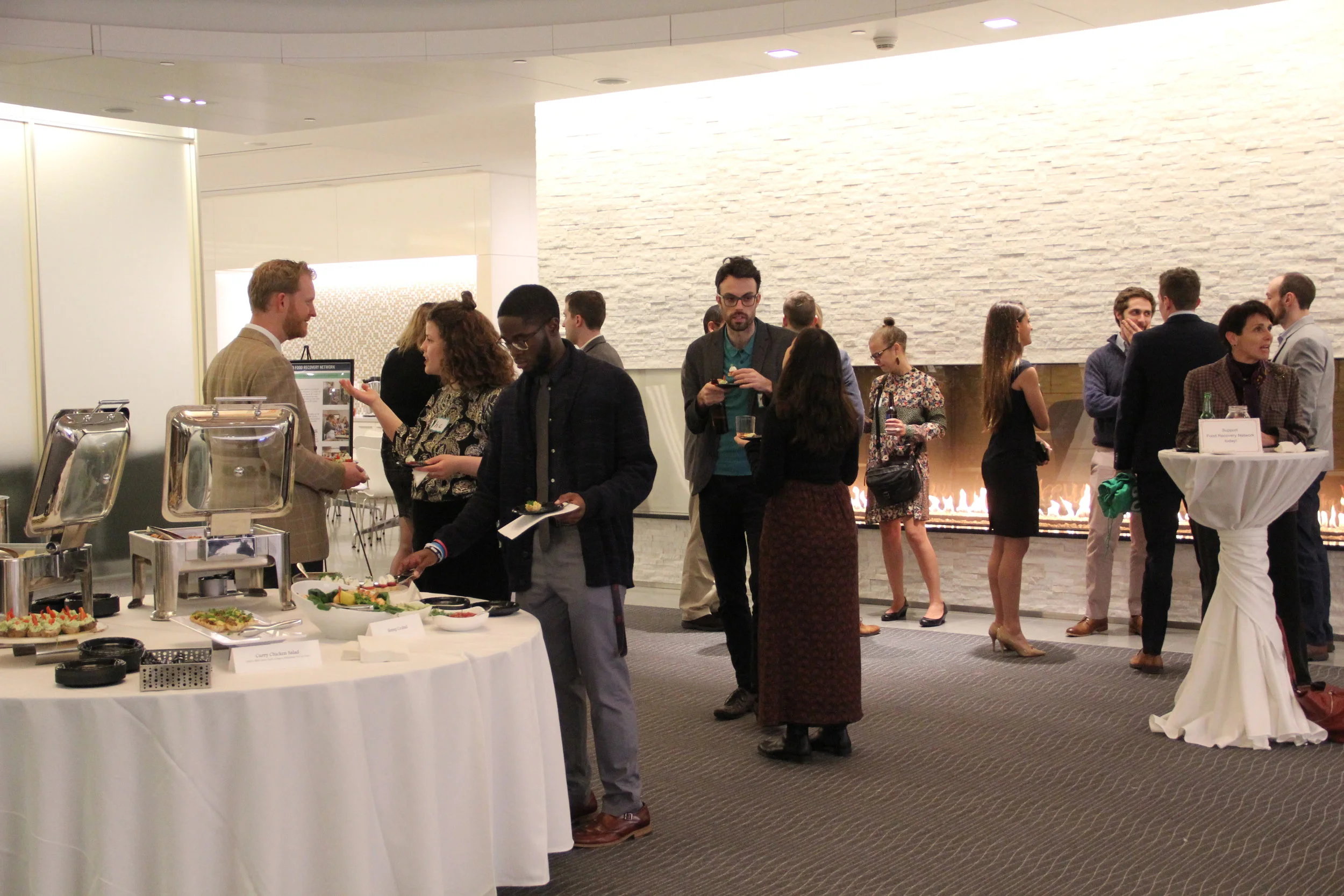Food Recovery Network’s “Love of FRNds” holiday party was a great way for me to see the passion of the FRN team in action. As a new intern, it was confirmation that I want to join the FRN team in spreading its message - one that is dedicated to limiting food waste and reducing food insecurity.
Seeing the 85 FRN staff members and guests present at the offices of Sidley Austin LLP in downtown D.C. on Feb. 8 was inspiring. It was obvious that everyone at the event was present for a shared purpose, a sentiment expressed by Michael Boyd, communications and development fellow and holiday party co-planner. Research and Outreach VISTA Sam Yates also organized the event, which included selecting student speakers and decorating the modern space. The goal of the party, according to the FRN team, was to showcase FRN’s vital role in the food recovery movement and to thank those who assist the nonprofit in fighting waste and feeding people.
Light refreshments and hors d'oeuvres were donated by the law firm and neatly arranged on white linen tablecloths, available for guests’ enjoyment. Participants had the opportunity to mingle and partake in a silent auction, which offered items ranging from dinner with Executive Director Regina Northouse to artwork, yoga classes, and museum tickets. “FRNds” were also encouraged to purchase FRN swag, such as T-shirts, sweatshirts, baseball caps, pins, and tote-bags, to support the organization.
The money raised from the event — a whopping total of $2,400 — is going to be used to support FRN’s 235 chapters in 44 states and Washington, D.C.
“We treat every dollar that comes to our office like it’s five dollars,” said Northouse of FRN’s creativity and resourcefulness. From my experience at FRN thus far, I can definitely confirm that that’s true.
About midway through the event, guests gathered — some standing, due to the large turnout — to hear Bill McConagha of FRN’s National Board of Directors, Northouse, and FRN student leaders Annika Vaerst, Manuela Romero, and Ogechi Onwuemenyi speak.
McConagha, who is a partner in the Sidley Austin LLP Food and Drug Practice and joined FRN’s national Board of Directors in September, praised students’ “incredible work” and for “effectuating their vision[s]” into reality.
Vaerst, University of Maryland’s chapter president, told the crowd how UMD hit their 200 thousandth pound of food recovered last fall. UMD, which was founded in 2012 as FRN’s first chapter, remains one of the network’s top recoverers, according to the senior chemical engineering major.
“We are not about complacency,” Vaerst said. “At FRN, we are never finished because we always know there’s more to do.”
Romero, George Washington University’s FRN chapter president, explained how her team had to adapt to GW’s dining-hall-free campus by facilitating recoveries after campus events.
“Event organizers order tons and tons of extra food because they don’t want anyone to leave the event hungry,” the junior biology major said, adding that much food would go to waste at GW if not for FRN.
Onwuemenyi, a senior English and Philosophy double major and soon-to-be president of FRN’s new Howard University chapter, expressed how he “spent a great deal of time and effort” this past fall working with the Howard administration to implement FRN on his campus.
Northouse, who has been working for the nonprofit for almost three years, concluded the presentation with a toast.
“There are so many incredible people in this room that I’m really blown away,” Northouse said, smiling.
She thanked FRN staff and affiliates, including Sidley Austin LLP for hosting, the Sodexo Stop Hunger Foundation, Hungry Harvest, The Campus Kitchens Project, and D.C. Central Kitchen.
“I am just blessed every day to work with really cool people,” Northouse said of the FRN National team. “That doesn’t even do justice to how awesome this crew is.” She urged members of the audience to donate money to support FRN.
“Truly, when you support FRN that’s what you’re supporting,” Northouse said. “You’re supporting people getting fed today, tomorrow, and the next day.”
As Lark Lewis, a friend of Boyd who attended the event, said, FRN is all about “fighting the good fight.” Perhaps that is because most in the organization feel there is always more to do — a sentiment Vaerst expressed in her speech.
“At FRN, we are never finished,” Vaerst said. “We never take success as finished.”
As I sit here in FRN’s College Park headquarters, it’s dark outside, yet the office is bustling with productivity. Keys are clicking, conversation is happening. Meetings are happening, emails are sending. My view: a green painted map with post-it notes marking FRN chapters across the country. There’s almost more paper than paint; almost more color than green. Yet, something tells me that the nonprofit will still continue to plan.





